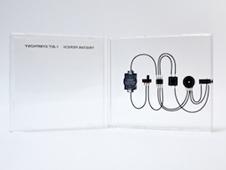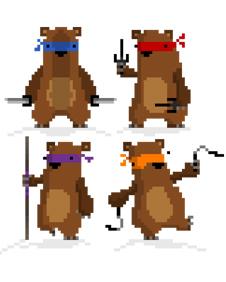How computer games are creating new art and music
- Published

Tristan Perich's 1-Bit Symphony
The sights and sounds of old-school games like Frogger and Donkey Kong are now becoming a part of mainstream music and culture.
A burgeoning movement of musicians and artists are getting inspiration from the games of the past.
Tristan Perich is a composer and visual artist in New York. He works with low level electronics and he's about to release the 1-bit Symphony on a single microchip, housed in a CD case. An electronic circuit synthesises the music that Perich has coded and programmed onto the chip.
A small battery, volume adjuster, fast-forward button and on/off switch are added to create a beautifully minimal presentation that plays one bit sounds.
"I'm from the same generation as chip tune artists," says Mr Perich. "The aesthetic of the sound itself, the buzz and tone is something I find to be really beautiful.
"Lately I have tried to take it more toward mathematics and the limits of logic rather than chiptunes. But then it's all microchip music so I am part of that world."
Chiptune music, which enjoyed its heyday in the 1980s, was created using either a computer or video game console sound chip,
The revival of chip music is by no means limited to the United States, Matthew Carl Applegate is a chiptune artist in the UK who works under the name Pixelh8.
"The chiptune scene in the UK is exploding, we're only a little island and one person can upload a track to Myspace one night and about 30 000 people will try to copy it the next day - music moves so quickly online.
"In the States, there's the 8bit Collective forum which is excellent for beginners who want to learn. There's also tonnes of chiptuners making music in places like Indonesia. They're into hacking and that sort of culture so there's a boom."
Mr Applegate's performances cross the divide between a niche musical genre and mainstream. He has performed at Bletchley Park and will return there this month to the National Computer Museum to play live with Orchestral Manoeuvres in the Dark.
Others are following suit with musician and producer Mark Ronson who has worked with Lily Allen and Amy Winehouse, producing tracks that bear more than a passing reference to the music of NES game, "The Legend of Zelda".
Luxuriating in the limitations

Simon Cottee's pixellated ninja bears
The beeps and blips of familiar games is only one part of the revival. Games animation is also inspiring a new generation of artists.
Animation student Simon Cottee is based in Queensland, Australia and he has produced a ten minute documentary for the web that highlights the benefits of pixel art.
The methods of working in this way may produce nostalgic and entertaining results, but the process can be long and difficult.
Cottee points out, "It can be tedious placing each box. There's different levels of pixel art depending on the resolution you work in. It can be confusing too because you cannot move characters around as you would in other animation. The limitations can also be liberating though as you can get a lot out of the bold colours and shapes."
Video game generation

Matthew C. Applegate performs chiptunes as Pixelh8
Some of the artists working with pixels and chips are too young to have played the vintage games they take their inspiration from. Simon Cottee is 22, but still has a GameBoy for reference.
Matthew Applegate admits that he had the games the first time around, but they were too expensive to be able to buy many, "I had a Nintendo and to go back to it is a wonderful thing. I wanted a BBC Micro but I could only afford to buy that now as an adult. It's like a second childhood."
He regrets that he wasn't able to fulfill his ambitions earlier.
"There's a sad irony that my teacher told me I would not get anywhere playing video games," he said.
"I went back 10 years later to give a special lecture on video games and entertainment industry at that same school and that was the same teacher who asked me to come back.
I failed my IT course because my work was too creative and I was meant to be making databases. Now I lecture on a course that I asked for when I was a student."
You can hear more about the project in this week's Outriders.
- Published29 April 2010